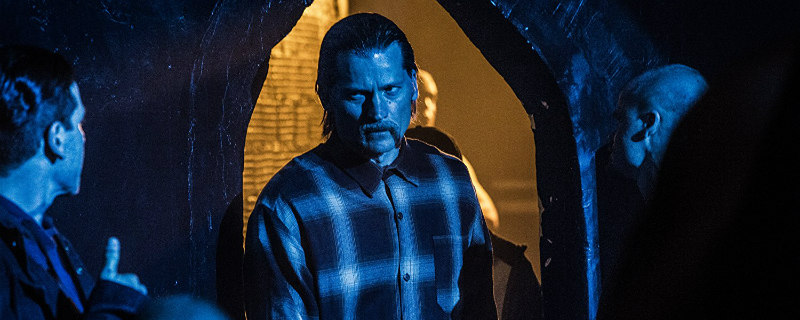
To survive in prison, a stockbroker joins a violent gang of white supremacists, but finds he can't leave them behind once released.
Review by Eric Hillis
Directed by: Ric Roman Waugh
Starring: Jon Bernthal, Holt McCallany, Nikolaj Coster-Waldau, Emory Cohen, Lake Bell, Jeffrey Donovan, Benjamin Bratt, Max Greenfield

How far would you go to survive in prison? Would you be willing to compromise your morality and beliefs to avoid being 'shanked' in the showers? Liberalism doesn't go too far inside, especially in America's prisons, where inmates generally stick to their own ethnicity, seeking strength in numbers by forming racially based packs. Regardless of his views on race, a white man's best chance of survival in a US prison is to align himself with a white supremacist gang.

That's the lesson Jacob Harlon (Nikolaj Coster-Waldau) quickly learns in writer-director Ric Roman Waugh's Shot Caller, which completes a loose incarceration trilogy along with Waugh's earlier films, Felon and Snitch. A successful stock-broker who kills his friend (Max Greenfield) in a drink driving incident, Harlon is sent to a tough California prison for an initial 16 month sentence. Following his lawyer's advice on how to survive, Harlon takes on the first black inmate who challenges him, attracting the attention of the prison's branch of the Aryan Brotherhood, led by the violent Shotgun (Jon Bernthal, typecast as a psycho once again after brief reprieves in Wind River and Sweet Virginia).
Beginning by acting as a drug mule - transporting narcotics filled balloons inserted in his anus around the prison - Harlon slowly earns the trust of the gang, and gradually rises through the ranks, his body becoming increasingly adorned with tattoos as he performs a variety of tasks, including murdering another inmate, the latter incident leading to his sentence being increased to seven years.

Harlon's prison experience is presented in a series of extended flashbacks, intercut with a plot that follows him on his eventual release as he becomes involved in a gunrunning operation between the AB and a deadly Mexican cartel. This main narrative isn't half as interesting as the behind bars material, playing like a sombre, self-serious riff on Carlito's Way, albeit one in which the protagonist has given up any hope of returning to a life outside crime. Combine this with the prison flashbacks and Waugh's film plays much like an Anglo-Saxon remake of Edward James Olmos's American Me (one of the few worthwhile films to come out of the early '90s gangster drama fad), but with a far less intriguing protagonist.
Waugh refuses to delve into the psychology of Harlon, and we never get any insight into how he feels about being pulled into the tattooed bosom of white supremacy. Is he compromising his beliefs for the sake of survival, or was he a racist to begin with? No answers are provided, which makes you wonder why Waugh chose this specific and very timely milieu as a backdrop for a half decent prison drama and sub par crime thriller.

As such, it's practically impossible to warm to Harlon, despite a quietly impressive performance by Coster-Waldau, the Danish star fully convincing as an American. The film doesn't ask us to sympathise with him, making it clear that he accepts his responsibility for his friend's needless death, and we fully understand why he does the awful things he does while inside. But on the outside he's simply a dangerous criminal, with the added baggage of his neo-nazi leanings. There's a great movie to be made about how white supremacy is cultivated in America's prisons, but Shot Caller isn't it.

Shot Caller is in UK cinemas now.

